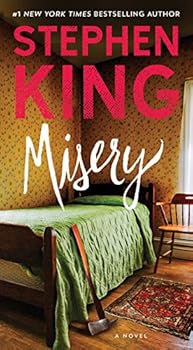If you’ve read one Stephen King novel, you’ve read nearly all of them. And yet people keep coming back for more. Published in 1987, Misery explores King’s relationship with his most obsessive readers while also wrestling with his own addictions.
Misery‘s plot is pretty straightforward: Paul Sheldon is an author of best-selling novels who one night drunkenly drives into a blizzard and crashes. When he wakes up, he has been (not rescued, but) kidnapped by Nurse Ratched, here named Annie Wilkes.
Annie is a nurse who has access to painkillers and although she helps Paul to heal, she is obsessed with his novels. She insists that he write for her.
As Paul mends, he becomes addicted to the painkillers. He is not telekinetic, so can he find another way to break free of his dependency and of Annie?
Like so many of Stephen King’s novels, Misery uses imprisonment to explore addiction. These prisons, literal and figurative, appear in many of his works, including ‘Salem’s Lot, The Shining, Cujo, The Eyes of the Dragon, the DARK TOWER novels, “Rita Hayworth and the Shawshank Redemption”… Here, the prison is a wheelchair in a bedroom.
Perhaps the most interesting thing about these prisons is how often the gleaming and free world is in sight and how helpless the characters feel to reach it. It’s difficult not to read these as stories about addiction in which the hero could be sober if he could just manage to control one overriding impulse. Then, King twists the world just a bit more to turn the addiction narrative into a thriller.
Although I was hesitant to read another King novel, I picked up Misery because so many of King’s fans praise it. Like everyone else, I found myself sucked into the plot and more or less finished it in two long reading sessions. Because it doesn’t have aliens or monsters or alternate universes or telekinesis, it might be a useful entry for readers who want to know what all the fuss is about but who are reluctant to engage with more imaginative motifs.
And it is, of course, required reading for any serious reader of Stephen King.




Just the title of your review makes me shiver, Ryan!